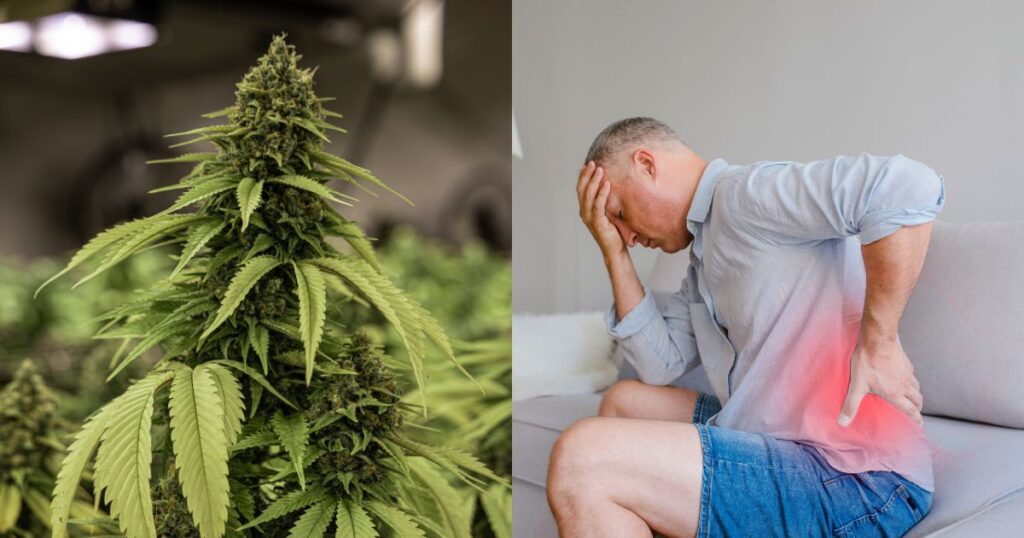A study has finally answered a question that has puzzled some researchers and patients for years: Does medical cannabis actually reduce pain, or do people just feel better because they expect it to work?
The answer is clear. Cannabis provides genuine pain relief that goes far beyond the placebo effect, and the specific chemical makeup of different cannabis products can predict how well they’ll work for individual patients.
The Science Behind Cannabis Pain Relief
Researchers from the Technion-Israel Institute of Technology studied 329 people with chronic pain who used medical cannabis. Using advanced machine learning techniques, they analyzed approximately 200 different chemical compounds found in the cannabis products these patients received.
The results were remarkable. The team could predict which patients would experience significant pain relief based solely on the chemical profile of their cannabis, even though patients had no knowledge of what specific compounds they were receiving. This finding provides solid evidence that cannabis offers real therapeutic benefits beyond patient expectations.
The study found that 45.3% of patients experienced meaningful pain relief (defined as a 20% or greater reduction in pain scores), while 16.4% had minor relief and 38.3% experienced no improvement. Most importantly, those who found relief could be identified based on the specific combination of chemical compounds in their cannabis products.
Surprising Discoveries About Cannabis Compounds
One of the most unexpected findings challenges conventional wisdom about which cannabis compounds are most important for pain relief. While THC and CBD are the most famous cannabinoids and often considered the primary therapeutic agents, this research revealed they had limited predictive value for pain relief outcomes.
Instead, lesser-known compounds called terpenoids emerged as the key players. Specifically, two terpenoids called alpha-Bisabolol and eucalyptol were much better predictors of treatment success than THC or CBD levels.
This discovery suggests that the cannabis industry and medical community may need to shift focus from the traditional emphasis on THC and CBD percentages to consider the full spectrum of compounds present in cannabis products.
Entourage Effect Gets Scientific Support
The research provides strong evidence for what cannabis researchers call the “entourage effect” – the idea that cannabis compounds work better together than individually. Rather than any single compound being responsible for pain relief, the study found that specific combinations of multiple compounds working in concert provided the most benefit.
This helps explain why previous studies focusing on isolated compounds often showed mixed results. The therapeutic effects appear to emerge from complex interactions between different cannabis chemicals, rather than from any one component acting alone.
The finding has important implications for how cannabis-based medicines are developed and prescribed. Instead of trying to isolate single “active ingredients,” the research suggests that whole-plant approaches considering the complete chemical profile may be more effective.
What This Means for Patients and Medicine
These discoveries could revolutionize how medical cannabis is prescribed and used. Currently, many patients and healthcare providers focus primarily on THC and CBD content when selecting cannabis products. This research suggests they should also consider terpenoid profiles and the overall chemical composition.
The ability to predict treatment outcomes based on chemical profiles unknown to patients also definitively settles the debate about whether cannabis effects are “just placebo.” Since patients couldn’t know which specific compounds they were receiving, yet treatment success could still be predicted from those compounds, the study proves that cannabis provides genuine pharmacological pain relief.
For the millions of people worldwide suffering from chronic pain, this research offers hope for more personalized and effective cannabis-based treatments. Rather than trial-and-error approaches, future medical cannabis programs could potentially match patients with specific product formulations based on their individual needs and the chemical profiles most likely to provide relief.
The study also supports the growing body of research showing that cannabis can be an effective alternative to opioid pain medications. The ongoing opioid crisis highlights the urgent need for scientifically validated alternatives to manage pain effectively.
The Larger Impact of Cannabis Research
This research represents the kind of rigorous scientific investigation that cannabis medicine has long needed. By using machine learning to analyze complex interactions between multiple compounds and patient outcomes, researchers were able to detect patterns that traditional statistical methods might miss.
The findings challenge the medical establishment to take a more sophisticated approach to cannabis therapeutics. Rather than viewing cannabis as a crude herbal remedy, this research demonstrates that it contains a complex pharmacy of compounds that can be studied, understood, and optimized for specific medical conditions.
As cannabis legalization continues to expand globally, studies like this provide the scientific foundation needed to develop evidence-based medical cannabis programs. They help legitimize cannabis as a serious medical treatment while providing practical guidance for patients and healthcare providers.
Looking Toward the Future
Although this study specifically examined pain relief, researchers could apply these methods to other medical conditions where cannabis shows promise, such as epilepsy, anxiety, and inflammation. Understanding how different chemical profiles affect various symptoms could lead to highly targeted cannabis-based medicines.
The researchers acknowledge that their study has limitations, including a relatively small sample size and focus on short-term outcomes. Future research with larger, more diverse populations and longer follow-up periods will help confirm and extend these findings.
Despite these limitations, the study provides compelling evidence that medical cannabis offers genuine therapeutic benefits for pain management. By embracing a more comprehensive understanding of cannabis chemistry, the medical community can work toward developing safer, more effective, and more precisely targeted treatments for the millions of people suffering from chronic pain worldwide.
This research marks an important step forward in legitimizing cannabis as a scientifically validated medical treatment, moving beyond anecdotal reports to rigorous evidence that cannabis provides real, measurable benefits for patients in pain.

















